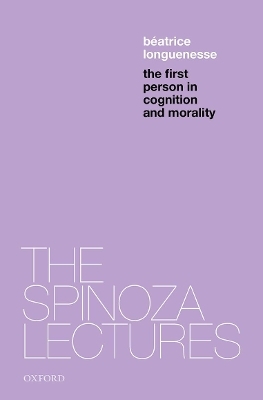
The First Person in Cognition and Morality
Seiten
2019
Oxford University Press (Verlag)
978-0-19-884582-9 (ISBN)
Oxford University Press (Verlag)
978-0-19-884582-9 (ISBN)
Béatrice Longuenesse explores the two aspects of our conception of ourselves when we use the pronoun 'I': how the possibility of first-person thought is internally related to objective, shareable judgments, and how the tacit egoism of the first person is internally related to the impersonal or universal standpoint of morality.
What do we express when we use the first-person pronoun 'I' in phrases such as 'I think' or 'I ought to'? Do we refer to ourselves as biologically unique, socially determined individuals? Or do we express a consciousness of ourselves as the bearers of thoughts we share, or can share, with all other human beings whatever their particular biological, social, or cultural background?
Every year the Faculty of Philosophy at the University of Amsterdam invites a prominent philosopher to occupy the Spinoza Chair and give two public lectures on a topic in philosophy. Beatrice Longuenesse, in these lectures, explores the contrast and complementarity between these two aspects of the use of 'I'. Her first lecture considers the first-person pronoun in relation to the exercise of our mental capacities in abstract reasoning, and in relation to our knowledge of objective facts about the world. Her second lecture explores the use of 'I' in relation to what we take to be our moral obligations. In bringing together these two fascinating lectures, this book presents contrasting aspects of the self as radically individual on the one hand, and as the bearer of universally shared capacities on the other.
What do we express when we use the first-person pronoun 'I' in phrases such as 'I think' or 'I ought to'? Do we refer to ourselves as biologically unique, socially determined individuals? Or do we express a consciousness of ourselves as the bearers of thoughts we share, or can share, with all other human beings whatever their particular biological, social, or cultural background?
Every year the Faculty of Philosophy at the University of Amsterdam invites a prominent philosopher to occupy the Spinoza Chair and give two public lectures on a topic in philosophy. Beatrice Longuenesse, in these lectures, explores the contrast and complementarity between these two aspects of the use of 'I'. Her first lecture considers the first-person pronoun in relation to the exercise of our mental capacities in abstract reasoning, and in relation to our knowledge of objective facts about the world. Her second lecture explores the use of 'I' in relation to what we take to be our moral obligations. In bringing together these two fascinating lectures, this book presents contrasting aspects of the self as radically individual on the one hand, and as the bearer of universally shared capacities on the other.
Béatrice Longuenesse is Julius Silver Professor of Philosophy at New York University. Her current interests include history of philosophy, contemporary philosophy of language and mind, and philosophical issues related to Freudian psychanalysis. She has written numerous books, including Kant on the Human Standpoint (Cambridge 2005), Hegel's Critique of Metaphysics (Cambridge 2007), and I, Me, Mine: Back to Kant, and Back Again (Oxford 2017). She also co-edited Kant and the Early Moderns (Cambridge, 2008) with Daniel Garber.
Preface
Lecture 1: 'I,' Singular and Universal
Lecture 2: 'I' in Morality: Enlightenment and Suspicion
| Erscheinungsdatum | 27.11.2019 |
|---|---|
| Reihe/Serie | The Spinoza Lectures |
| Verlagsort | Oxford |
| Sprache | englisch |
| Maße | 126 x 191 mm |
| Gewicht | 128 g |
| Einbandart | Paperback |
| Themenwelt | Geisteswissenschaften ► Philosophie ► Ethik |
| Geisteswissenschaften ► Philosophie ► Sprachphilosophie | |
| Geisteswissenschaften ► Psychologie ► Allgemeine Psychologie | |
| Geisteswissenschaften ► Psychologie ► Verhaltenstherapie | |
| ISBN-10 | 0-19-884582-0 / 0198845820 |
| ISBN-13 | 978-0-19-884582-9 / 9780198845829 |
| Zustand | Neuware |
| Informationen gemäß Produktsicherheitsverordnung (GPSR) | |
| Haben Sie eine Frage zum Produkt? |
Mehr entdecken
aus dem Bereich
aus dem Bereich


